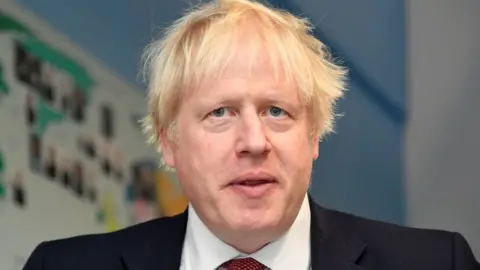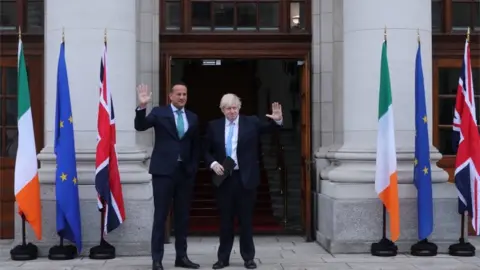Brexit: Boris Johnson has ruled out NI-only backstop
 Toby Melville/pa
Toby Melville/paThe prime minister has ruled out a Northern Ireland-only backstop.
During a Facebook live on Wednesday afternoon Boris Johnson said the UK "will not accept" it.
Earlier, DUP leader Arlene Foster said a Northern Ireland-only backstop was anti-democratic, but believed the prime minister "is in the space of trying to find a deal".
Sinn Féin has warned that unionist parties cannot not be given a veto over any Brexit deal.
There had been speculation the government is re-considering the idea of a so-called Stormont lock to break the impasse.
It would create a formal mechanism for consulting and seeking the approval of Northern Ireland's devolved administration in the backstop, allowing the Stormont parties a say before any divergence between NI and GB would happen, after Brexit.
However the Stormont institutions collapsed in 2017, after a row between the power-sharing parties.
Parliament is currently suspended for five weeks. When sitting, the prime minister answers questions from other MPs on Wednesdays.
During the live stream on Wednesday Mr Johnson said: "The backstop is going to be removed, I very much hope. I insist, it's the only way to get a deal.
"We will not accept either a Northern Ireland only backstop, that simply doesn't work for the UK.
"We've got to come out whole and entire and solve the problems of the Northern Irish border and I'm certain that we can do that. And we're working flat out to do that".
On Wednesday, Sinn Féin leader Mary Lou McDonald said the current backstop negotiated by the UK and EU remained the only solution.
However, speaking earlier on BBC Radio Ulster, Mrs Foster said: "It's not just the DUP that rejects the backstop, it's a much wider coalition that rejects the backstop.
"What we need to do now is reject the backstop, move on and find a deal that works.
"That's what I'm focused on and I think it's what the prime minister is focused on as well."
Decreased influence?
The backstop is the insurance policy to maintain an open border between Northern Ireland and the Republic of Ireland after Brexit, until a wider solution is found.
Mrs Foster, who met the prime minister on Tuesday, said the government was "exploring" an all-island food standards zone as part of a solution to replace the backstop.
She denied the DUP's influence with the prime minister had waned after he lost his parliamentary majority.
The DUP had been propping up the Conservatives in a confidence-and-supply pact since June 2017, with the votes of its 10 MPs giving the government a majority to get legislation passed in Parliament.
However, last week Mr Johnson lost his majority after 21 Conservative rebels had the whip removed for voting against the party on Brexit legislation.
 PA Media
PA MediaIt means he no longer requires the DUP's votes, but Mrs Foster said her party had a "much wider bond" with Mr Johnson than just the political arrangement.
She said she believed the prime minister was true to his word in ruling out a Northern Ireland-only backstop.
There are suggestions that the government is contemplating such a proposal in order to ensure the UK leaves the EU with a deal by 31 October, but Mrs Foster said that was not true.
She also dismissed suggestions that a solution could end up being the backstop by another name, adding: "It's not just a case of tampering with words."
On Tuesday, the former Taoiseach (Irish PM) Bertie Ahern said consent from Northern Ireland's unionist parties was "essential" if a deal was to be reached.
But Sinn Féin's Ms McDonald said: "It's a dangerous idea that veto would be afforded to the DUP on this matter."
Her party had engaged in talks with the DUP for many years and this would continue, she added.
But she warned: "There is simply no meeting of minds on the matter of Brexit."
'Abundance of proposals'
The prime minister has insisted he will not seek an extension to the Brexit deadline if there is no agreement with the EU.
In Dublin on Monday, Mr Johnson said he had an "abundance of proposals" to replace the backstop.
The idea of a NI-only backstop was first suggested early in the Brexit negotiations.
Former PM Theresa May rejected it in 2018 because she relied on the votes of the 10 DUP MPs in Parliament.
The Irish government has said it is willing to look at a "Northern-Ireland specific solution".
On Tuesday, Ireland's EU Commissioner Phil Hogan told RTÉ that there was "movement" on both sides of the Brexit negotiations.
